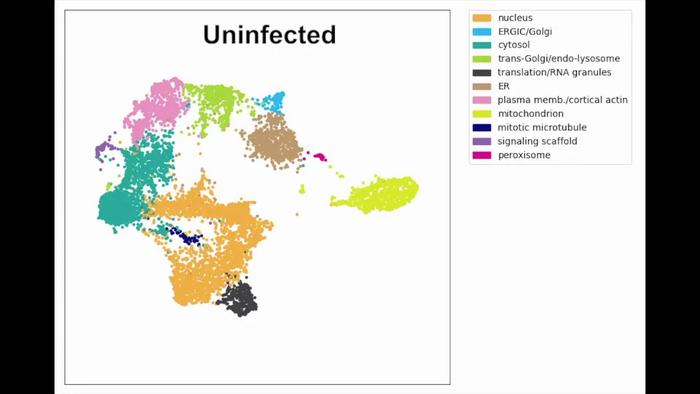
Proteins are the molecular workhorses of cells, each performing specialized tasks essential to cellular health and function. Understanding how these proteins are spatially organized within the cellular environment is crucial for comprehending their role in various biological processes, particularly during states of stress or disease. A recent study shed unprecedented light on the spatial organization and dynamic behavior of proteins within human cells, revealing insights relevant to cellular responses during viral infections.
Traditional research on cellular proteomics has often focused on quantifying protein expression levels, which provides valuable data but may not capture the complete picture of cellular responses. The study conducted by a multidisciplinary team at the Chan Zuckerberg Biohub San Francisco introduced a novel approach termed “Organelle Profiling.” This technique enables scientists to visualize how proteins are distributed across different cellular compartments, offering a more comprehensive understanding of their roles in cellular behavior.
The research team successfully tagged 19 distinct cellular compartments, producing a spatial map of over 8,000 unique proteins. This methodology allows scientists to assess the functional state of a cell by revealing not only the types of proteins present but also their precise locations. This level of detail was previously unattainable, highlighting the exciting potential of spatial proteomics in modern biomedical research.
Upon exposure to a common cold virus, OC43, the researchers noted that relocation of 633 proteins significantly altered their interactions within the cellular landscape. This shift marked a pivotal moment in understanding how cells adapt their functions in the face of viral threats. In a surprising turn of events, while 429 proteins showed fluctuations in abundance, only 54 proteins experienced both alterations in location and changes in quantity, suggesting a disparity between simply counting proteins and understanding their dynamics.
The implications of these findings are profound, particularly regarding the role of proteins involved in programmed cell death, specifically ferroptosis. By demonstrating that increased ferroptosis can facilitate viral infection, this study provides an exciting avenue for therapeutic intervention. By targeting the pathways involved in ferroptosis, researchers might discover novel antiviral strategies that improve cellular resilience against infections.
What sets this study apart is the integration of cutting-edge mass spectrometry with innovative spatial mapping techniques. By carefully extracting individual compartments and analyzing their protein contents, the researchers crafted an intricate network of protein interactions that delineate cellular architecture. Such methodologies not only enhance our understanding of protein localization but also pave the way for future investigations into cellular behavior across various disease states, from infections to neurodegenerative disorders.
Furthermore, the findings emphasize the importance of examining spatial organization and protein dynamics rather than solely focusing on abundance. By doing so, scientists can obtain a richer, more nuanced understanding of cellular processes. This shift in focus could inspire re-evaluations of existing research methodologies, encouraging a more holistic approach to cellular biology.
As researchers continue to explore the implications of these spatial mapping techniques, the data generated will be made available to the scientific community. This commitment to open science ensures that others can build on these findings, potentially leading to new discoveries in the realm of cellular biology and disease research.
The investment in technologies that allow for the study of protein dynamics will undoubtedly inspire a new generation of research. By emphasizing collaboration and data sharing, the CZ Biohub team fosters an environment ripe for innovation, encouraging diverse approaches that propel our understanding of complex biological systems.
In summary, the revelations brought forth by this groundbreaking study on spatial proteomics unveil a new frontier in cellular biology. As scientists begin to realize the importance of spatial organization in biological systems, the potential for discovering new strategies for disease treatment expands exponentially. The intricate dance of proteins within the cellular environment is now better understood, setting the stage for further exploration.
This pioneering research has implications that stretch far beyond a single study. It holds the potential to impact numerous fields, from diagnostics to therapeutics, and promises to pave the way for innovations in our approach to health and disease. As our understanding of cellular dynamics deepens, it may forever change the trajectory of molecular biology and medical science.
Subject of Research: Spatial organization of proteins in human cells
Article Title: Groundbreaking Advances in Spatial Proteomics Unveil Protein Dynamics During Viral Infections
News Publication Date: October 2023
Web References: Cell, CZ Biohub San Francisco
References: OpenCell, Organelle Profiling, Mass Spectrometry
Image Credits: Manuel Leonetti, CZ Biohub San Francisco
Keywords: spatial proteomics, protein dynamics, cellular organization, viral infections, ferroptosis, Chan Zuckerberg Biohub, mass spectrometry.





